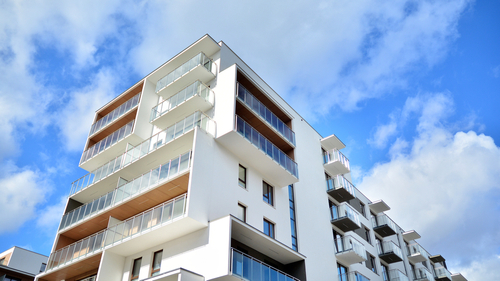rules | establishment | amenities | cost
When it comes to housing, a condominium has fewer rules than an apartment. The building itself is owned by the development company, and there are many unit owners. These owners can either live in the unit or lease it out to others. Let’s do condominiums v/s apartments!
Condos are more expensive than apartments, but they come with more amenities. You’ll find yourself wondering: What’s the difference? Let’s explore the pros and cons.
Condominiums v/s Apartments
There are fewer rules and restrictions in condominiums than there are in apartment complexes, so tenants can enjoy more freedom and more privacy. Apartment owners are typically required to pay monthly HOA fees, which may increase depending on the amenities offered by the association.
Additionally, owners typically have fewer rights to privacy and noise, and they may also be subject to restrictions that limit their ability to decorate their apartment or even use it for their business. In addition, apartment rules can also prohibit tenants from having pets or changing the wall color.
Apartments also tend to have more restrictive rules and regulations than condominiums.
Most condos have fewer rules than apartments, but you must be aware of any special rules that may be in place. For example, some condominiums prohibit pets, while others do not. Also, condos are more likely to have a community board that helps regulate the rules of the complex.
This is also an advantage for tenants who want to live in a pet-friendly environment. However, it is important to check with the landlord to see if there are any special requirements or restrictions for renting a condo.
Unlike apartments, condos have more character. This is because the landlord probably stayed in the building at one point in their lives. Because of this, the rules of decorating in a condo are generally less strict.
The landlord may even allow residents to make interior design changes according to their personal tastes. Furthermore, it can be rewarding to have a personal relationship with a landlord, as opposed to a management company.
Compared to apartments, condominiums are more affordable. Although condos do not have private outdoor space, they offer exceptional convenience and are often the choice of people who live in urban areas.
Aside from the many amenities available in condos, residents choose condos to live in them for their convenience and privacy. Some have doormen, fitness centers, swimming pools, event spaces, and even rock climbing walls.
Condos also offer many amenities, and some even have doormen or bowling alleys.

Condominiums v/s Apartments– Establishment
Apartments and condos are part of a larger building with multiple units owned individually. A Homeowner’s Association maintains these buildings, and the owners pay dues to cover common area maintenance and expenses.
However, the main difference between an apartment and a condo is ownership. Apartments are generally owned by one entity, and the individual tenants lease out their units to other tenants.
When comparing prices, condominiums v/s apartments often have comparable prices. While apartments are managed by a large corporation, condo owners are more likely to communicate with renters. In addition, condo owners may be keen to attract responsible renters.
Some condos offer perks like concierge services, swimming pools, and outdoor spaces. Unlike apartments, however, the costs of condos are lower, often including a flat utility fee and waived HOA fees.
Another condominium v/s apartment is the living and maintenance. Apartments generally come with basic amenities, like parking, on-site laundry, and free maintenance. On the other hand, condos come with many amenities, which vary depending on the HOA (homeowners association).
Some of the larger condo complexes offer amenities like a fitness center, a lounge, and outdoor spaces. A major difference between apartment living and condo living is that condos usually come with a maintenance fee that is shared among residents.
If you are renting a condo, you’re responsible for repairs inside your unit, so make sure that you have a few extra dollars set aside for repairs.
While the majority of apartments are still relatively new, condominiums are a good choice for some people. In general, condominiums are owned by an individual, who also acts as a landlord. The structure of a condo is clearer and may include extensive amenities.
In addition, condo owners often have incentives to invest in the property and have lived there before renting it out. A condominium is a good option for people who are looking for a more private living situation.
While apartment-style living is more convenient, it isn’t ideal for long-term stays. While apartments often have a higher quality and more expensive property, many people prefer condos because they have direct access to the owner.
In addition to establishing a good relationship with the owner, you’ll also need to work out maintenance issues and other concerns that may arise on the property. By following these guidelines, you can ensure your own safety and that of your unit.
Condominium v/s Apartment: Amenities
In addition to having more space, a condominium also offers more amenities. Along with a common wall, a condominium may also have upgrades that an apartment does not. Also, many condominiums offer more amenities, such as a pool or community room.
A condominium may also have more upgrades than an apartment, so be sure to ask your landlord about the amenities available at your complex. Buying a condo is generally the best option for those who are looking for a spacious home.
One of the main differences between an apartment and a condominium is the level of privacy. In an apartment, you’re likely to be living in a communal space, so the amenities offered are limited.
However, if you choose a condominium, you’ll have more privacy and flexibility in arranging your living space. Apartments, on the other hand, are often noisy and have many neighbors. As a result, you’ll have fewer neighbors if you’re renting, and your landlord’s rules can be stricter.
Common amenities vary between condos and apartments, although many apartment communities include common amenities like pools, gyms, and laundry facilities.
Condominiums have additional amenities, such as concierges, but residents share the costs of maintaining these amenities. It may offer more amenities, such as a concierge, fitness center, lounge, and swimming pool.
These also generally have more modern appliances and kitchen appliances.
A condo also comes with additional rules. While an apartment does not have shared outdoor space, it has walls and common areas.
There can be issues with noise if a neighbor is not quiet. If you have a dog, you might have to ask permission from the homeowners’ association to let your dog or cat stay. Likewise, condos may have strict rules about how guests can spend their time.
You may also find that your neighbors won’t want to spend time in the condo, so don’t let this deter you from buying one.

Condominium v/s Apartment: Cost
There are several key differences between condominiums and apartments. In addition to their higher purchase prices, condos and apartments also have more common charges.
Although condos and apartments have similar down payment requirements, they are more expensive than co-ops. A condo is also less likely to have a homeowner association, meaning that the building’s management is in charge of the common areas.
However, between condominium v/s apartment, the latter can be easier to rent out or sell.
Apartments and condos have similar characteristics, although the latter tends to be managed by a group of people. While apartment owners are likely to communicate with renters, condominium owners are more likely to be involved in their property.
Both condos and apartments can be equally expensive, depending on the neighborhood and mortgage terms. Although condos are more expensive than apartments, they are more easily affordable if you have a good credit score.
In addition to shared roofs, condos and apartments also have common maintenance costs. While condominiums and apartments are similar in appearance, the two types differ in costs. An individual owns a condo while a group of people owns an apartment.
In many cases, condo owners live in their units. Apartment owners lease out their units to rent them. The costs are higher than in single-family homes, but the benefits make up for this.
Another major condominium v/s apartment attribute is the cost of closing. In the fourth quarter of 2018, the median price of a resale Brooklyn condo reached $690,000, a 7 percent increase from a year ago.
In comparison, Manhattan’s median price was $1.4 million. Moreover, a one-bedroom condo in Brooklyn has more square footage than a one-bedroom unit in Manhattan.
While Manhattan’s real estate market is recovering, prices for close-in neighborhoods have been creeping up. Some parts of Manhattan have single-family homes, while others have condos and rental properties.
In Riverdale, for example, affluent neighborhoods have a mix of single-family houses and co-ops. But in other neighborhoods, people prefer three-family brick houses over co-ops and condominiums.
